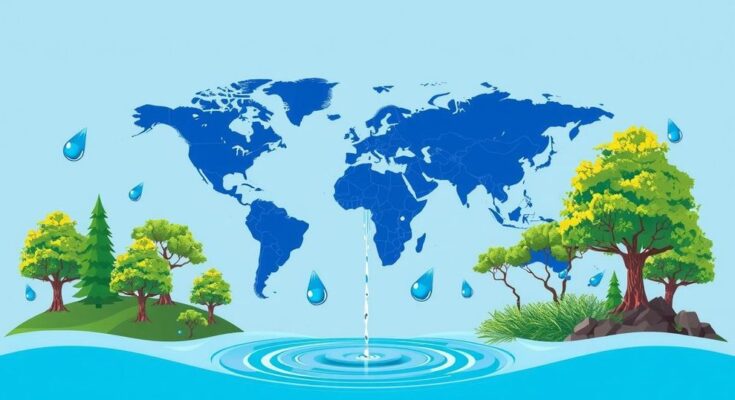World Water Day, established on March 22, highlights the urgent need to address water issues worldwide. Celebrated since 1992, it emphasizes the relationship between water and public health, exacerbated by climate change. Water is crucial for all life forms and ecosystems, yet human activities threaten its availability. A change in perspective on water usage is necessary to foster sustainability and biodiversity.
World Water Day, celebrated on March 22, was established by the United Nations following the Global Environmental Summit in Rio de Janeiro in 1992. This occasion highlights that over two-thirds of diseases affecting humanity are water-related, thereby emphasizing the importance of addressing drinking water and waterborne illnesses, particularly in developing countries. The urgency of the matter has been exacerbated by climate change, which has triggered severe environmental challenges affecting water availability for all.
Water is vital for life, comprising approximately 70 percent of the human body. It serves essential roles in biological processes and has been a fundamental factor in the development of life on Earth. Additionally, water bodies and ecological zones are necessary environments for not only humans but all organisms, ensuring their survival in a constantly changing climate. Water’s thermal properties help mitigate climate fluctuations, offering essential adaptability opportunities.
Despite its significance, water resources are diminishing due to human activities that favor convenience over sustainability. Urbanization and land conversion practices, such as transforming river systems into agricultural fields, hinder groundwater replenishment, thereby threatening ecological diversity. The reshaping of rivers for human convenience disrupts their natural forms and diminishes their ability to provide ecological services, leading to adverse effects on life and the environment.
Moreover, invasive plant species introduced into aquatic systems further upset the natural balance, exacerbating challenges posed by climate change. It is crucial to evaluate whether our modified water systems can withstand natural disasters like floods and droughts, with active human intervention required to rectify any weaknesses identified during inspections.
On World Water Day, it is imperative to change our perception of water from being an unlimited resource to recognizing its finite nature and vital role in sustaining life. By preserving aquatic ecosystems in their natural state, we can better ensure they remain a survival resource for all forms of life, including humanity.
In conclusion, World Water Day serves as a reminder of the critical importance of water in sustaining life and the significant challenges posed by climate change to our water resources. It is essential to reassess our relationship with water, prioritizing its preservation and mindful use to safeguard both ecosystems and human life. Upholding natural aquatic systems will enhance biodiversity and improve our resilience to environmental changes.
Original Source: www.koreatimes.co.kr




